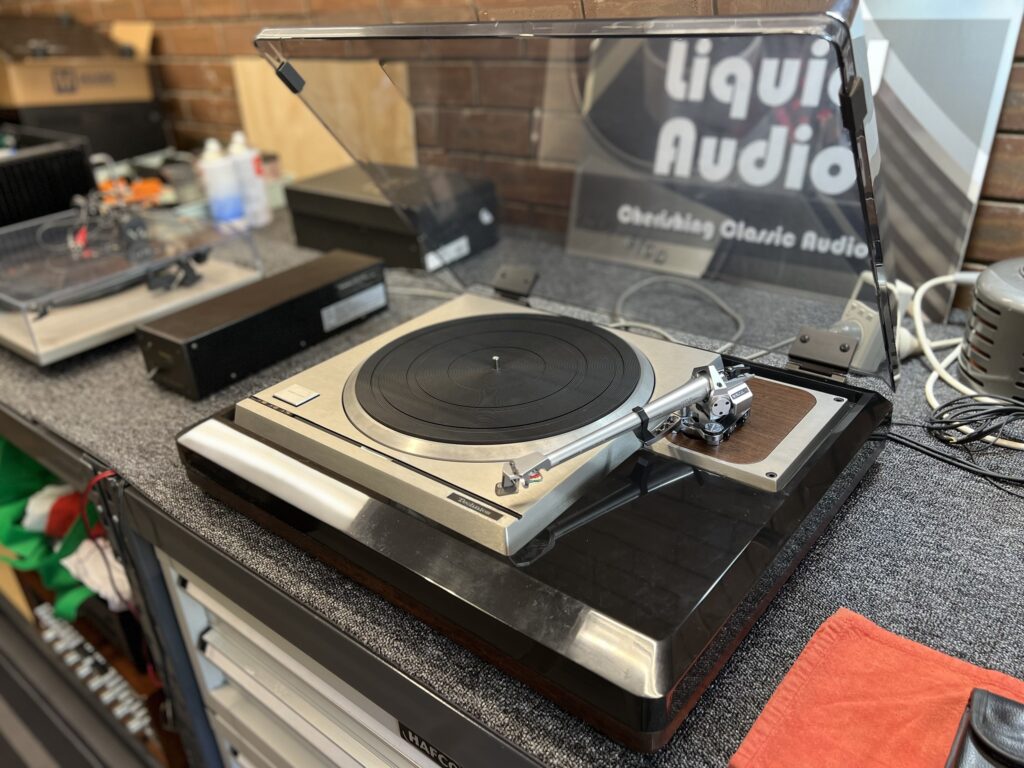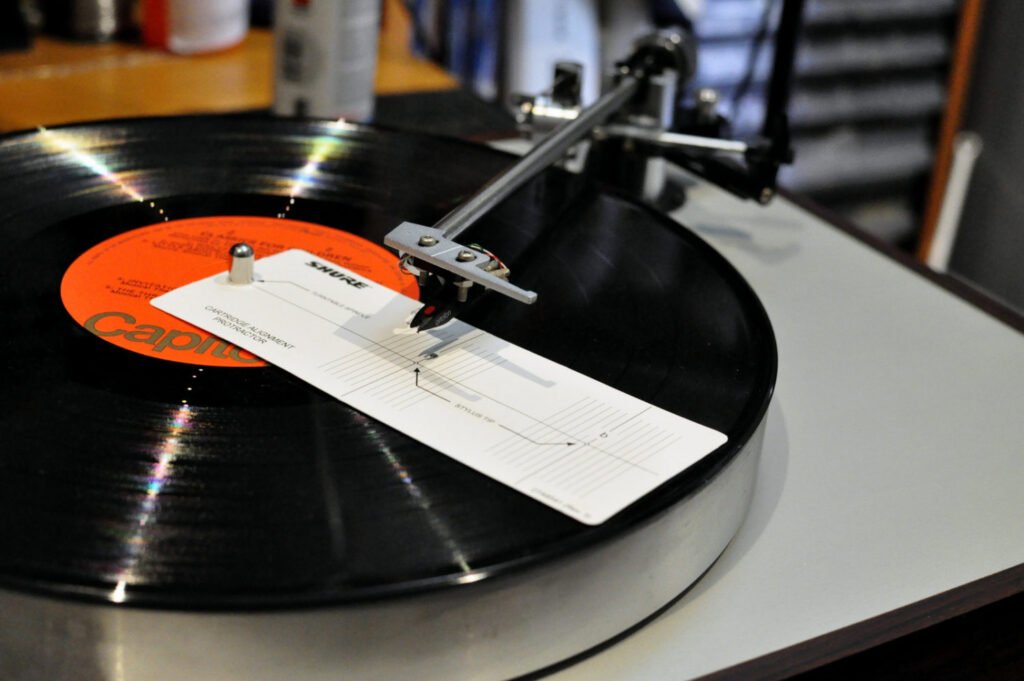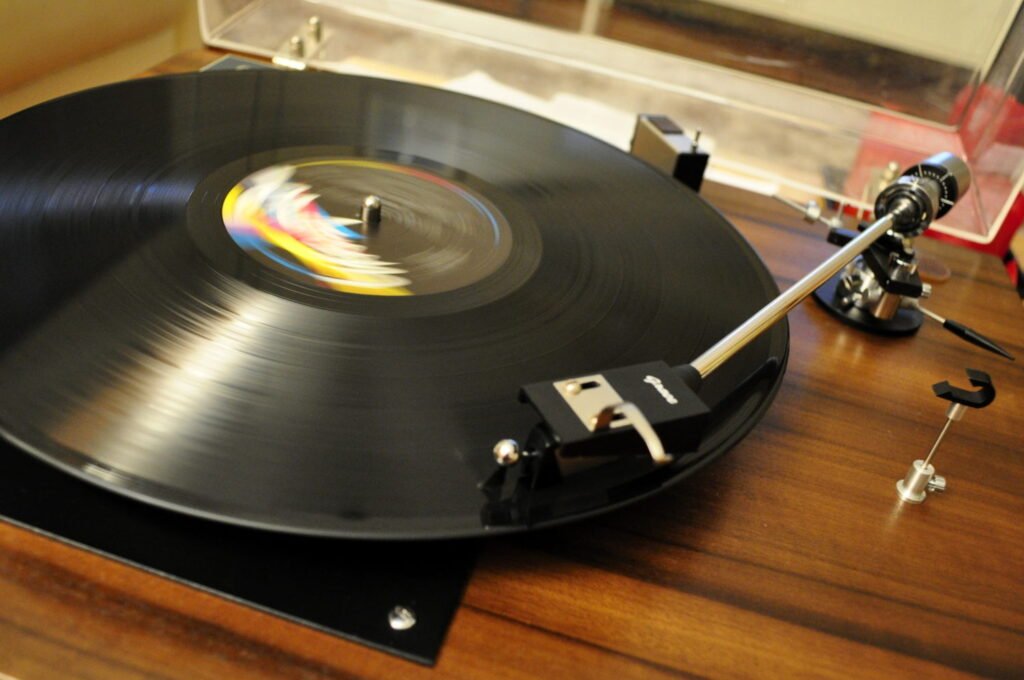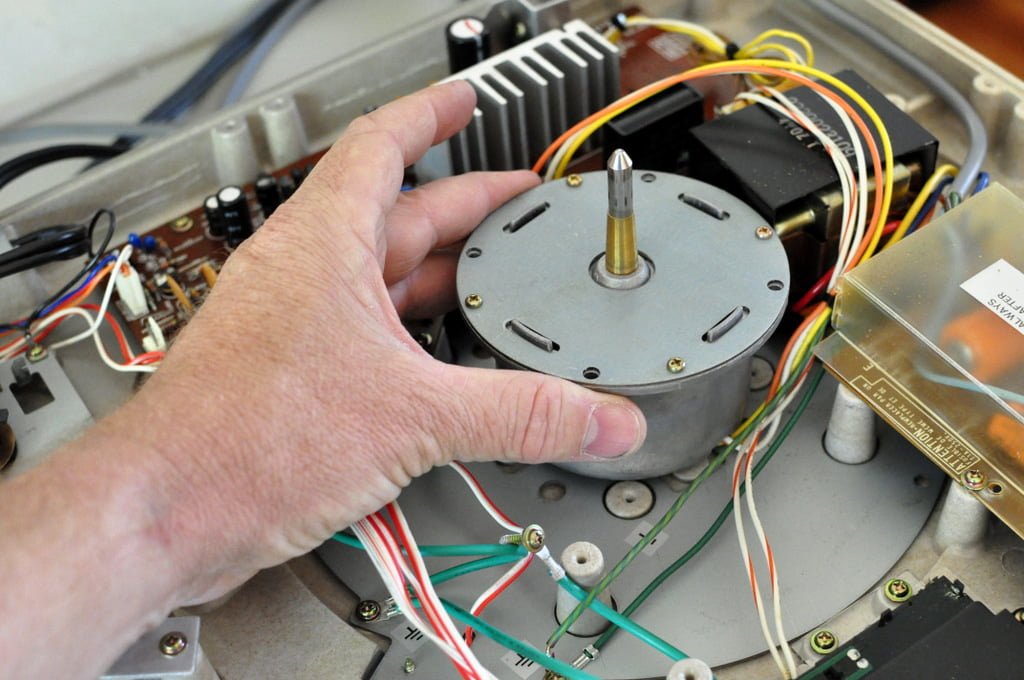Every so often, a customer brings me something that reminds me just how much I love vintage hi-fi. The Dual 1219 idler-drive turntable is just such a thing.
The Dual 1219 idler-drive turntable is a relic from an era when almost everything was made out of metal and wood. The Dual 1219 is German and old, so this type of solid construction should be no surprise.
Idler-Drive
The Dual 1219 uses an idler-drive unlike most other turntables, which use belt or direct-drive for their platters. Idler-drive decks utilise a powerful motor that drives a rubber wheel, which in turn drives the inside edge of the platter.
Whilst idler-drive decks are unlike direct-drive or belt-drive machines, some would suggest that they combine the best of both worlds. I’m not sure I agree with this, but they certainly can play records very well when correctly set up and well-maintained.
And therein lies one of the caveats. Their downside also relates to set-up and maintenance. Idler-drive decks typically need more regular maintenance than belt-drive machines and much more than direct-drive decks. The idler drivetrain can be problematic and maintaining it requires expert attention.
Dual 1219 Specifications
Courtesy of Vinyl Engine
Power supply: AC, 50 or 60Hz, changeable by changing the motor pulley
Voltage: 110/117V or 220V switchable
Drive: Synchronous motor with radial-elastic suspension
Platter: non-magnetic, dynamically balanced, 3.1kg
Speeds: 33, 45 and 78rpm
Pitch control variation: 6%
Rumble: -60db (weighted)
Tonearm: extra long, torsionally rigid metal arm, 4-point gimbal suspension, skeletal head design
Cartridge holder: removable, accepts cartridges from 1 to 12g
Weight: 6.8kg
Dimensions: 376 x 334mm

The Good
There’s a lot to like about the Dual 1219. It’s a very serviceable machine. Those with experience and the correct tools and lubricants should be able to make good progress. The metal and wooden parts respond well to cleaning and lubrication and there are few plastic parts to fail. If you are not sure though, it’s best to seek out an expert.
Bearings and metal parts are very long-lived and everything is robustly constructed. There are no belts as drive is to the inside of the platter, via an idler wheel. Idler-drive machines tend to play records very well as a result of the high torque this arrangement delivers, like good direct-drive decks.
The motor is likely to last a lifetime and, speaking of the platter, it’s heavy and dynamically balanced. In fact, the platter makes up half of the total mass of the deck. The Dual 1219 also plays 78s and can repeat play records, great for parties! Automatic start and stop are bonuses that many people enjoy.
The Bad
The Dual 1219 and other Duals from this era are complex and need frequent maintenance. Lubrication points are many and varied, as are the lubricants and their modern substitutes. Servicing a deck like this doesn’t take an hour as it does with many simpler machines. A Dual 1219 needs several hours of specialist service time, every five or so years and service involves careful disassembly, cleaning and lubrication of something like a dozen service points.
If you are not up for that regimen, this probably isn’t the deck for you. Hoping your deck is different is about as helpful as hoping you won’t get older. Just accept it, find a good technician to partner with and have some servicing done to remove the old congealed lubricants as this helps a great deal.
Some 1219s come in some pretty sketchy wooden cabinets too, so watch out for that. For more on the Dual 1219, Tone Audio wrote a nice piece about the deck, check it out.
Problems
Synthetic lubricants weren’t a thing back in 1971. The half dozen or so specific mineral oils and greases used in the Dual 1219 don’t hold up well over 50+ years, nor should we expect them to. These are highly mechanical decks and all the points specified in the service manual need greasing or oiling with correctly graded modern lubricants.
Many owners don’t understand the maintenance requirements of decks like the Dual 1219, with the result that they are often partially or completely seized by the time a technician sees them. This unit was very solidly seized and it took methodical work over several hours to resolve her issues. Is it worth it? Of course, nothing like this will ever be made again, and even if it was, you probably couldn’t afford to buy it!
There are also issues with Dual’s ingenious/ridiculous removable cartridge system. The delicate little fingers and spring-loaded pins can break. If they do, it’s trouble.



Service & Repair
The first thing to do with one of these decks is to remove the mechanical element or actual turntable from the chassis.









Cabinet
I like this cabinet, but it was looking a little worse for wear when it came in.














As always, thank you for reading. If you would like me to service or repair your Dual turntable, don’t hesitate to get in touch.








I still have my 1219. My favorite is my 1229, which I use daily. I replaced the tonearm on the 1229 with a Grace 747. It’s magical, and I like it better than my Garrad 301. The turntable sounds just as nice, and the motor is dead silent. Something the Garrard isn’t.
I hope that you pulled the motor apart and soaked the top and bottom bearing in oil. They dry out after 40 years. But you are correct. These will run forever.
Excellent post.
Norman
Hi Norman, thanks for your comment and I agree, these are great decks. I have another 1219 here for service that I haven’t started yet, but will soon. You are correct that it is essential to lubricate the motor. There are actually a couple of effective ways to do this besides soaking the bearings as you describe. Lubrication throughout the deck is also critically important, but when properly cared for, these are great machines!
Dear Mike, I am so lucky to find your article: I have now two 1219’eens which are desperately in need of servicing. I like your excellent detailed photos and explanations. However, you stress so much the point that several different but correct materials should be used for the different parts of these “machines”, but the only material you really recommend is the Australian bee wax…!
Could you please be more specific about which lubricants you actually use? And for the benefit of your international admirers please give besides specific trade names also a little technical description as not every trade mark is everywhere available.
Yours faithfully, Hanan
Hi Hanan, thanks for commenting and I’m glad you found the article helpful! The articles are not really meant as ‘how-to’ guides, they are more about showing the type of work I do for my customers, the level of precision involved and the results, whilst offering a little help for DIYers out there at the same time. I purposefully don’t go into all the lubricant details because that would take a video all on its own and realistically, most people shouldn’t be going inside one of these things anyway. If you live near Perth, you are most welcome to chat about booking your decks in for service. I realise many of my viewers don’t live near Perth though, so that makes things harder!
Hi Mike, Thanks for the prompt reply. I suppose Jerusalem, ISRAEL is not that close to Perth, Australia…
In the mean time I found several discussions about these lubricants, suggestions for replacements etc.. I’ll start my study and preparations with this subject.
I’m lucky nothing is stuck in my turntables so I’ll try to avoid too much disasseblies.
Still your discussiion will be a great help I’m sure.
Best regards, Hanan
Hi Hanan, understood and yes that creates a problem in terms of just dropping by! Start with the service manual, they list the original types. I find modern substitutes in 4 broad types useful: light and medium-weight synthetic oils and light and medium-weight synthetic greases. A lithium-based light grease is also a useful addition to the group. With these, you can tackle most of the lubrication requirements of a deck like this. There are always others that are useful, like penetrants for these decks where mechanisms have become seized, which is common.
I DUAL 1219 which needs total Service & Overhauling. I live in New Delhi, India.
Could anyone help me to get contacts in New Delhi for the repair.
Hi Vikas and thanks for your question. Your 1219 really needs to go to a specialist repairer. You could start by contacting the best hi-fi stores in the city and see who they use, but the problem will likely be the lack of this sort of gear in India, and therefore a lack of people with the skills necessary to work on it. There were no high-end hi-fi stores when I visited New Delhi but perhaps things have changed? I did a quick search and could not find any.
I have a Dual 1219 that I bought new in the 70’s. It was in service until 2004 then has been stored in my Florida closet until recently. I have done a little reading and research and have attempted to get it up and running again.
Everything mechanical is working now except the multi/single play lever remains frozen in the multi play position. The rubber washer thingie that holds the two ball bearings in place was petrified hard. I removed it and replaced with a Dorman 90100 fuel injector washer that came in that kit. It fit perfectly. I did not remove the ball bearings at the time however and the arm is still frozen in place.
The cartridge is a Shure V15, type II that I bought years ago and the needle appears fine under magnification.
Here is my largest concern. When I balance the tonearm and adjust the anti-skate and tracking force to 1.75 grams, the record plays great for a few seconds and then I hear an audible pop which I thought initially was just a scratch on the record. Immediately after the pop (which seems to occur once per revolution) the record will not advance in the groove and replays the same track over. I’m starting to think the pop noise is not a scratch. Adjusting the tracking force and or anti-skate seems to make no difference. Any ideas what might be causing my issues?
Hi Jim, thanks for your question. As you can imagine, diagnosing complex mechanical systems exhibiting multiple issues, like your 1219, without physically having access to them is tough and not something I really even get involved in. It sounds like you have a friction issue somewhere in the tonearm or tonearm mechanism, plus other problems. Obviously, you first need to try different records, and determine with certainty that the stylus is OK. Beyond that, I’d suggest trying to find a local technical expert, though I realise this is the hardest part of the equation.
I completely understand. Finding someone in South Florida that can look at it will be difficult. I’ll try to tackle one issue at a time. How can I free up the tone arm from the frozen multi-play position? Should I remove the new rubber washer I previously installed and try to remove the two ball bearings. They are probably stuck in the detent groove with old hard lube. Would liquid wrench free up the mechanism?
Hi Jim, I don’t know without seeing it, unfortunately. Without your deck here in front of me, there’s not a lot I can suggest, other than to carefully disassemble, clean, lubricate and reassemble everything correctly. I’d avoid liquid wrench or anything like that, other than as a tool to assist in stripping and cleaning the deck.
Hi Mike – I’m in Sydney and recently acquired a complete, but not operating, Dual 1219 turntable left behind when recently purchasing a house. I am technically proficient (mechanical engineer) and have worked on various electro mech systems. With the assistance of another article that goes to some depth on the service procedure I have made good progress cleaning up and relubricating the speed selector (this was stuck firm and is now operating smoothly). I am now in the process of cleaning and relubricating the motor.
The 60 hz motor pulley needs a very good clean, it appears to have black, likely rubber, solidly deposited onto its surface. I assume it is the rubber from the idler wheel albeit this looks to be in good order. I’d like to remove the motor pulley for cleaning and have removed the grub screw on the shaft of the pulley however it is stuck firm and refuses to move. I’m going to guess that the pulley is not a press fit onto the motor shaft. There is no sign of corrosion on the motor shaft/spindle.
Is there a trick to removing the pulley? Perhaps I could allow the end of the motor shaft with the pulley to soak in some solvent in the hope it might soften and loosen?
Grateful for any words of advice you might have.
Kind regards
Patrick
Hi Patrick, good news on obtaining a 1219, these are great machines! Technical queries can be directed through my contact page but yes, a solvent might work.
Many thanks – will give this a shot.
Hi Mike, just more a general Q about Dual ilder drive TTs, I was getting interesting in buying one , however do they all have the Achilles Heal issue of the weak headshell ? As in breaking plastic, the pins not making good contact? Cheers, neil
Hi Neil, good question! Whilst I’d love to give a definitive answer on this, there are so many Dual models out there that I honestly cannot recall if the idlers all feature this headshell arrangement. I can say that many of the older ones do, so checking in each case is a good idea. The system can work well if it’s in good condition and the deck has received the right care and attention over the years. Sadly this usually proves not to be the case.
Hi mike appreciate the quick response, ,my initial Q was after seeing your blog on servicing the 1228 . Im in Wollongong, and from time to time “12” series duals appear on 2nd hand markets. Maybe might try one. Even with the hea shell issue.
No worries Neil, definitely worth a shot if you don’t mind a quirky, relatively high-maintenance turntable. The 12 series are classics for sure, I see a few each year and, when running right, they play a record well.